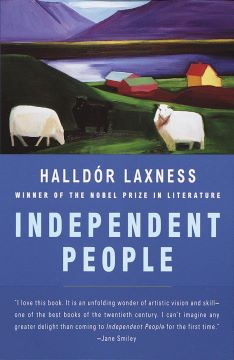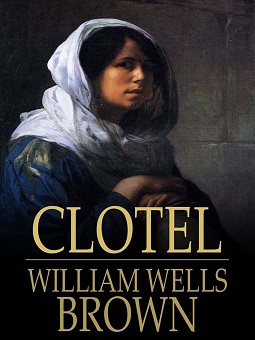Legends of the Fall (and Winter)
- Dorothy Reno
- November 25, 2024
Independent People’s grimly comic look at Iceland’s antiheroes.

My favorite scene in Nobel laureate Halldór Laxness’ novel Independent People (1934) happens at one of the story’s low points. Rósa, wife of Gudbjartur Jónsson (aka Bjartur of Summerhouses), has died in childbirth.
At the funeral, her father recites the Lord’s Prayer:
“Our Father, which art in heaven, yes, so infinitely far away that no one knows where You are, almost nowhere, give us this day just a few crumbs to eat, and forgive us if we can’t pay the dealer and our creditors and let us not, above all, be tempted to be happy, for Thine is the Kingdom…”
This passage is satire at its finest. In the 1997 edition, translated from the Icelandic by J.A. Thompson, it gets even finer. Bjartur, who is a poet and sheep farmer (in that order), refuses to bow his head because the prayer doesn’t rhyme.
If Iceland’s epic poems and myths underpin this story about 20th-century crofters, so does the funerary scene for being emblematic of the hardships — some more comedic than others — faced by Bjartur and his family.
Independent People (directly translated as “self-standing people” or “freestanding folk”) begins with Bjartur striking out on his own after laboring 18 years for a prosperous estate farmer called Jón of Mýri (known as the Bailiff). Choosing an inhospitable bit of land rumored to be haunted, and worse, mortgaged to Bjartur by the Bailiff himself, Bjartur buys some sheep, puts up a ramshackle croft, and marries Rósa, a worker on the Mýri estate.
Unbeknownst to Bjartur, Rósa is pregnant by the Bailiff’s son, Ingólfur Arnarson. Undeterred by the long winters, the unvaried diet of saltfish, or the 16-hour workdays as a shepherd, Bjartur sets his heart, what little he has, on the Icelandic Dream of freedom and independence.
And therein lies the humorous thrust of the novel: Laxness celebrates and mocks his culture for prising notions of freedom and independence from the abstract realm of political rhetoric and swilling them with the morning coffee. Bjartur is the tragicomic everyman who considers society “the ruination of the individual,” and the story turns on his taking ever-more-extreme measures to achieve self-sufficiency. It’s not just that Bjartur wants to make his own money; he refuses gifts, spits on tradition, and keeps his family as miserable as possible, lest they acquire luxurious habits (such as adequate nutrition, warmth, and love). Let us not, above all, be tempted to be happy.
Indeed, Bjartur makes for a strange poet.
In his favor, he rides a reindeer into a glacial river and lives to tell the tale. Upon getting lost in a snowstorm, he rages against the drifts by reciting all the great verses he knows. He puts sausages in his trousers to thaw them. (Is that a breakfast link in your pocket or are you just glad…never mind.) He names his sheep and knows them all by sight. He finds it refreshing to accidentally roll into a pond during his after-lunch nap.
And most importantly, he rears the baby left behind by his first wife, a little girl who is not, he now knows, his daughter. Sensing their fates are tied together, Bjartur honors her with a beautiful name, Ásta Sóllilja, or Sun Lily. Years later, after several of his sheep die under mysterious circumstances, he tells Ásta Sóllilja, “I’ll stand as long as there’s anything to stand on.” Bjartur is irascible and often a fool, but he’s no hypocrite.
Laxness offers many details about the sheep: the ringworm and maggots they catch and spread, the diarrhea that can kill them. This is a world where people wash once a year, snort tobacco for pleasure, scrape snow from their clothes using knives, and bury wives and children. The landscape is barren, but the myths are triumphant. In one, Grímur the Noble exacts justice; in another, a boy stumbles upon a fairy church in the forest and uses the experience as consolation for the rest of his life.
Critics have cited The Grapes of Wrath as the American analog to Independent People, notably around the themes of tenant farmers and poverty. For mood and tone, one might also point to Frank McCourt’s misery memoir, Angela’s Ashes, or draw parallels with Toni Morrison’s Beloved for its treatment of dignity and sacrifice. As a character, Bjartur is a cross between Tolstoy’s Levin and Dickens’ Ebenezer Scrooge. And although Independent People does not stand on its own next to a titan like Anna Karenina, it certainly comes close.
The central tension of the story plays out in the cat-and-mouse game between Bjartur and the Bailiff. Who will get the better of whom? Their regular, acrimonious exchanges become endearing — “No signs of worms or diarrhoea?” asks Bjartur. The Bailiff responds, “With me?” — but even so, they eventually reveal something sinister. The more one reads, the more one appreciates why Bjartur wants to remain unbeholden.
Yet the main sorrow in the book is that, in doing just that, Bjartur commits cruelties against his family, losing each member in their own way, first his two wives, and then most of his children.
Can there be any redemption here?
Maybe a little. But after finishing Independent People, one is left with the feeling that the independent among us don’t need redemption. Rather, Laxness offers a soaring takedown of the overuses and abuses of words like “freedom” and “independence”; a meditation on the small, meaningless (and meaningful) tasks that make up a life; and a philosophy on making choices, even if they amount to little in the end.
Laxness once famously said that Bjartur was “so stupid,” but we don’t believe him. Not completely.
Please share your experience reading Independent People in the comments below. You can join Dorothy in next reading The Catcher in the Rye, which will be the subject of her column on March 3rd, 2025.

